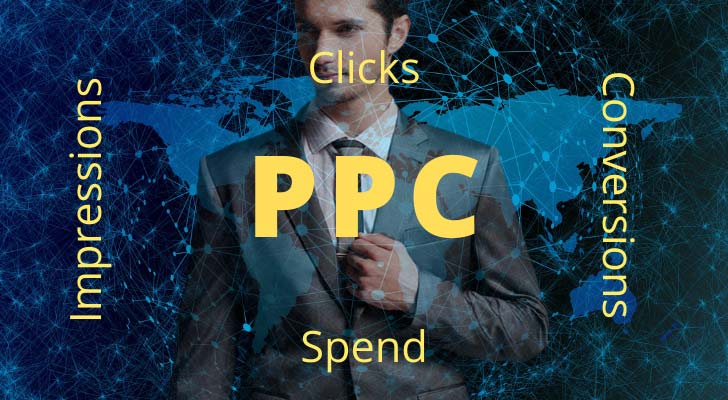If you are looking to increase your online visibility, PPC marketing should be on your top list. Paid search is an excellent way of appearing on top of search engines. PPC marketing is convenient since it requires zero SEO effort to appear on top of the search results.
But, to get the most out of PPC campaigns, it’s essential to understand what you are getting into. PPC marketing can strain your budget if done wrong and with no clear strategy.
In this article today, I will take a close look at PPC and explain what it exactly is. I’ll also discuss the uses of PPC and how to optimize your campaigns for overall digital marketing success.

What is PPC (Pay-per-Click) Advertising?
PPC is often discussed as part of Search Engine Marketing (SEM). SEM is an umbrella of digital marketing that encompasses both paid and unpaid searches. Paid searches, such as the PPC, require an amount of fee to operate. They also appear on top of unpaid, organic results.
The good thing about PPC is you don't have to pay a fee until a user takes action. This means that anyone running an ad only pays when a visitor clicks on their page. If let’s say, you appeared on the search results but the viewer scrolled past your ad, then you don’t have to pay a cent.
For a better understanding of PPC, here’s an example of how they appear on Google search results.
Did You Know?
- Average Click-Through Rate (CTR): The average CTR for PPC ads across all industries is about 2%.
- Cost-Per-Click (CPC): The average CPC in Google Ads across all industries is approximately $2 to $3.
- Conversion Rates: The average PPC ad conversion rate across all industries is about 3.75% for search and 0.77% for display.
- Return on Investment (ROI): Businesses typically make an average of $2 in income for every $1 they spend in Google Ads.
- Mobile PPC: Mobile devices account for about 53% of paid-clicks.

Why Use PPC?
There are many reasons why you need PPC for your digital marketing campaigns, but top on the list is to appear before the organic results. Though PPC advertising cannot replace SEO campaigns, it’s relevant for boosting the performance of poorly ranking pages.
Here are the three ways where PPC can be used to benefit your business.
1. Better Hyper Targeting with Paid Search
PPC campaigns allow for targeting. They can let you decide the type of customers you want to reach. If, for example, you sell shoes targeting a specific age group, setting these parameters will help you gain an audience that can convert.
PPC marketing does add value to your brand. It ensures you deliver personalized ads that are relevant to customers who need your products or services. Even better is the diversity in segmentation. You can choose to set parameters based on geographies, gender, age, or interests. The more personalized your ads are, the easier it will be for you to get qualified leads.
2. An Immediate Increase in Online Visibility
Improving your visibility through organic searches is no easy task. It could take months before you get on top of results pages, or even years if you don't closely research the niche, keywords and the competitors. But with PPC, you can place an ad today and start appearing in the top four results almost immediately.
This is particularly important when you are introducing a new product to the market. It makes it easy to create, promote, and grow your brand visibility with little SEO efforts. PPC also offers opportunities for you to get quick reviews on new products. This way, you can make changes before introducing a product to a larger audience.
3. A Clear Measurement of Results
Metrics speak a lot about business developments. It’s through metrics that you can know if current and previous digital marketing strategies are working. PPC makes it convenient for you to get advertising results. By opening your metrics tab, you can know how many people were there and their actions.
Here are the top four basic elements that PPC campaigns measures:
Impressions
This is the number of times search engines served your ad after a search. For example, if your ad appeared in 400 searches for the word “car seats”, that is termed as your impressions.
Clicks
These are the people who saw your ad and took action by going to your page. Clicks are an indication of people with a little extra interest in your advertisement.

Conversion
If the visitor goes the extra mile and interacts with your brand, this is known as conversion. Conversion is when a viewer downloads, purchases, or subscribes to a product or service you have advertised.
Spend
Every click costs some amount of money. If for example each click costs $1 and you’ve got 400 clicks, your spend is $400. Spend is the total amount used in a campaign.
After viewing your basic statistics, it’s essential to put them in a format relevant to your marketing campaigns. By combining the four results, you can track your performance and optimize specific aspects of success. Here are for combined metrics you should look out for and use to improve your performance:
Did You Know?
- Ad Spending: Total ad spend on PPC is expected to continue growing, with forecasts suggesting a significant increase year-over-year.
- Google Ads Dominance: Google Ads remains the most popular PPC advertising system globally, controlling a large portion of the market share.
- Video Ads: Video ads are becoming increasingly popular in PPC campaigns, with a significant percentage of marketers planning to increase their investment in video advertising.
- Social Media PPC: Facebook remains a popular platform for PPC advertising, with Instagram rapidly growing as a key channel for PPC.
- Local Searches: A substantial percentage of local mobile searches lead to an in-store visit within one day.
Click-through-rate (CTR)
It’s derived by dividing clicks by impressions. CTR is an indication of people that clicked on your ads. It’s used to measure the success of your campaigns with higher numbers indicating good results.
Conversion rate
It shows the percentage of viewers that click and convert from your ad. It’s calculated by dividing conversions by clicks. A higher conversion rate indicates success in your PPC campaigns.
Cost-per-Click (CPC)
This is the amount of money you are using per click in your campaigns. You can calculate your CPC by taking your spending and dividing by the clicks. A lower CPC indicates better efficiency in your campaigns.
Tips for Optimizing for PPC Marketing

Now that you know what PPC entails, it’s time to develop a strategy. A strategy will help you segment your audience and create a responsive PPC campaign. It will also optimize your PPC campaigns for the right searches.
State Your Goals
Before creating your campaign, it’s essential to know where you are going. By defining your goals, you will know the visitors you can target. Stating your goals will also inform the period you wish to run the advertisements. From the results, you can set a budget. For an effective PPC campaign, include these aspects in your plan:
- Where you want to run your PPC campaigns. A few examples include Bing Ads, Adrolls, Facebook Ads, Google Ads.
- Decide on the audience you want to reach by creating buyer personas.
- Have an estimate of how much you want to spend.
- Know how you will measure the results.
- Include the intended theme for the campaign
- Indicate the type of PPC campaign you want to run. For example, you can use search ads, display ads, remarketing, Google Shopping, or social ads.
Did You Know?
- Remarketing: Remarketing ads have a higher conversion rate compared to regular display ads.
- PPC for Small Businesses: A large percentage of small businesses allocate a portion of their marketing budget to PPC.
- B2B Marketing: PPC is a critical component of B2B marketing strategies, with a focus on LinkedIn for B2B marketers.
- Quality Score: The Quality Score in Google Ads is crucial, as ads with higher Quality Scores tend to have lower CPCs and better ad positions.
- Voice Search: The rise of voice search is influencing PPC strategies, with an increasing need to optimize for voice search queries.
Develop a Keyword Strategy
People have unique ways of searching online. While some prefer short tail keywords, others prefer longtail terms for definitive results. It’s for this reason that keyword research is essential for responsive PPC campaigns.
First, go to your ad group and look for the assigned keywords you can target. Next, create broad match keywords you are confident people may use in their searches. Make sure that the keyword phrase matches the theme of your ad. This is to ensure that you attract the right audience to your ad.
A point to note with keyword strategy is that it is a continuous process. You may have to change or tweak some terms if a particular approach doesn’t work. So, keep testing and measuring until you get keywords that attract the right traffic to your page.
Optimize for Search Engines
PPC marketing does not have to end with paying for ads. It should also involve SEO strategies that give long-term life to your business. For example, you can spread your broad-match keywords across different pages on your website to boost your organic results.
Also, ensure that you create high-quality content. Quality content will ensure that anyone clicking on your ads finds the correct information on your pages. When creating quality content make sure to have good structure, title tags, and meta descriptions that complement your ads.
Your outreach programs should also be top-notch. It would be frustrating to attract traffic through social ads and fail to convert them on your website. For greater success in your marketing efforts, ensure that your SEO team, PPC group, and blogger outreach services collaborate in the campaigns. The collaboration will be the perfect combination for your paid and unpaid searches.
Did You Know?
- Brand Awareness: PPC can increase brand awareness by up to 80%.
- Amazon PPC: Amazon’s PPC platform is growing, especially for e-commerce businesses.
- Ad Blockers: The increasing use of ad blockers is a challenge in PPC, affecting ad visibility.
- Automation and AI: Automation and AI in PPC management are becoming more prevalent, enhancing campaign efficiency and effectiveness.
- Competition: The competitiveness in PPC advertising continues to rise, leading to higher CPCs in popular industries.
Money Down the Drain
Let's be real, PPC marketing often feels like throwing money into a bottomless pit. You keep pumping cash into these campaigns, hoping for some magic to happen, and what do you get? A few clicks that barely convert.
And the cost? It's like every click is a golden nugget, and not in a good way. You pay through the nose for each one. For small businesses, this is a nightmare. You're basically gambling your limited budget on the slim chance of hitting it big.
Competition That's Just Too Much

The competition in PPC is like a wild jungle, and not everyone's Tarzan. Big players with deep pockets dominate the scene. They can afford to outbid you at every turn, making sure their ads stay on top. For the little guy, it's like showing up to a gunfight with a slingshot. You’re out there, trying your best, but these giants are playing in a different league. It's disheartening, to say the least.
Complexity for Days
PPC platforms are complex beasts. You need to be part analyst, part fortune teller to get them right. All those metrics, keywords, bidding strategies – it's like learning a new language, but not as fun.
For someone who's not a marketing guru, it’s overwhelming. And if you mess up? Well, that's your budget down the drain, with nothing to show for it. It's a high-stakes game where the rules are as clear as mud.
Questionable ROI
Return on investment? More like a return on imagination. You keep hearing these success stories, but when you try it, it's a whole different ballgame.
The amount of money and time you put into PPC doesn't always line up with the results. Sometimes it feels like you're just paying to keep the lights on at Google or Facebook. The promised land of high ROI often turns out to be a mirage.
Ad Fatigue is Real

Let's talk about ad fatigue. We're bombarded with ads everywhere, and people are tired of it. It’s like being at a party where someone keeps telling the same boring story. So, what happens? People tune out, or worse, get annoyed. Your PPC ads end up blending into the background noise of the internet. And with ad blockers on the rise, sometimes your ads don't even get a chance to be ignored.
Risk of Negative Perception
PPC can backfire in terms of brand perception. It's like being the person at the party who tries too hard. People start associating your brand with annoyance. Instead of drawing customers in, you might be pushing them away. It's a delicate line to walk, and not everyone does it gracefully.
Time-Consuming Management
Managing PPC campaigns is a time sink. It's not just set it and forget it. You need to constantly monitor, tweak, and babysit these campaigns.
For small business owners or teams, this is time that could be spent on other important aspects of the business. It's like having a needy plant that requires constant attention, but instead of growing, it just eats up your time.
What Do You Advocate?


It’s great to hear that you’re exploring PPC ads. Thank you for the info. Click-through-rate is definitely a metric to keep an eye on. A high CTR indicates that your ads are relevant and engaging to your target audience. I’m curious to hear about your results.
Hi, thank you for the explanation. Now I know what many people are talking about. I used Facebook without knowing all the terminology and when I asked people for advice I didn’t know what they were talking about. Now I know things like conversion and click through rate. Every new marketer should read this guide. Thank you.
It is a good thought but being stupid nothing happens like that. Go to Quora if you want people to debate.